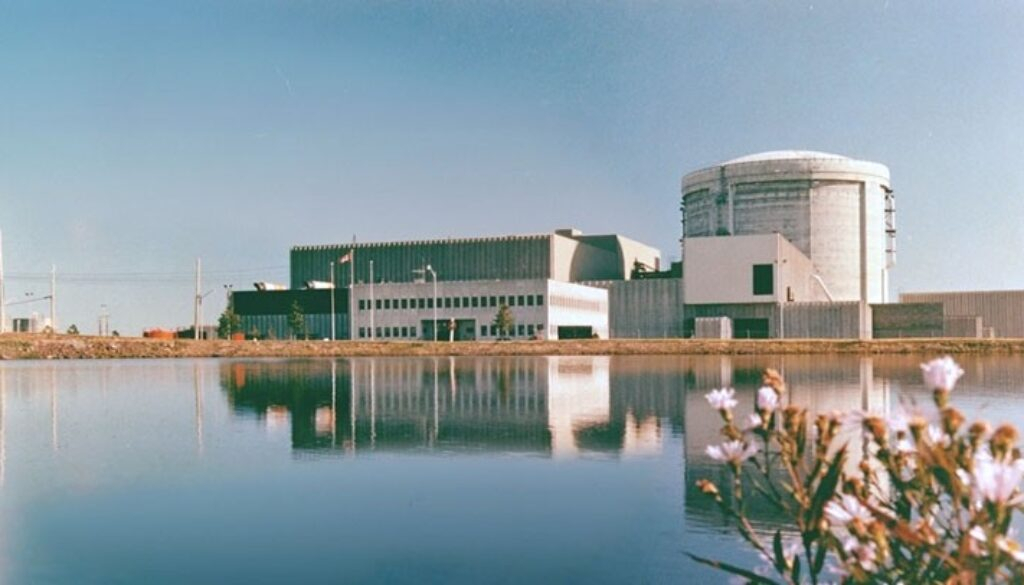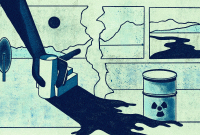Support strong Canadian climate journalism for 2025
Atlantic Canada’s only nuclear power plant is facing yet another unplanned shutdown. It will not funnel energy to the grid until at least mid-November, which critics say will translate to higher emissions and energy bills.
The Point Lepreau Nuclear Generating Station in New Brunswick provides about a third of the province’s energy. When it’s down, the province relies on dirty and expensive backup sources. The current shutdown of the aging plant has been tacked onto a planned shutdown, which started in the spring and was initially meant to last 100 days. Now, the station will be offline for at least 200 days in total.
Moe Qureshi, director of climate research and policy with the Conservation Council of New Brunswick, said the sputtering power plant is a costly symptom of the province’s overreliance on nuclear.
“It doesn't bode well that we can't even maintain our current reactor,” Qureshi said, noting that the province is investing in expanding nuclear, including small modular nuclear reactors (SMRs).
“How are we going to maintain an even more advanced reactor? And not only that, but we still don't know how much these advanced reactors are going to cost.”
NB Power did not respond to specific questions from Canada’s National Observer about the extended outage, what it might cost or other criticisms. The full extent of the issue is not yet known, the power corporation said.
The initial planned shutdown was for maintenance to prepare the plant for peak demand in winter. However, during that time a “critical issue related to the main generator on the non-nuclear side” was found, the utility wrote in a press release, prompting the current unplanned shutdown. (“This is like when you take your vehicle in for scheduled maintenance, and while your mechanic has the hood up doing the planned work, an additional issue is identified,” the utility quipped.)
The Telegraph-Journal reports that NB Power estimates it costs $900,000 each day the plant is shut down.
To supplement lost power, the province buys additional hydropower from Quebec and fires up backup power sources, which run on fossil fuels. One of N.B.’s backup plants is Belledune, a coal-fired plant that produces approximately 14 per cent of the province’s energy mix. Others include the Coleson Cove Generating Station, which runs on oil, and the Bayside Power Station, which runs on gas.
Point Lepreau, which went online in the 1980s, is one of four nuclear power stations in Canada and the only one outside of Ontario. Consisting of a heavy-water CANDU reactor that generates power, it received a decade-long operation extension from the Canadian Nuclear Safety Commission in 2022. The plant’s current license was ending, so it was required to apply for a new one.
The province is facing a looming federal deadline to get off coal by 2030, and says it will convert Belledune to biomass by that date. However, Premier Blaine Higgs has said the province won’t “put ourselves in jeopardy, turn the lights out, because we have a magic 2030 date.”
Rate Hike Hearings
Instead of investing in reliable and proven renewable energy sources such as solar and wind, the province is resisting transitioning off fossil fuels while hinging its energy future on nuclear power, Qureshi said. The province plans to develop small modular nuclear reactors (SMRs), and is also set to connect to Nova Scotia’s energy grid through a federally supported intertie.
A 2015 report from the International Energy Agency (IEA) and the OECD Nuclear Energy Agency found electricity costs from SMRs are predicted to be 50 to 100 per cent higher than typical nuclear reactors.
While opponents say nuclear is costly and comes with too many risks related to nuclear waste, in its Net Zero by 2050 roadmap, the IEA calls for a doubling of nuclear power generation from 2020 to 2050, with “with construction of new plants needed in all countries that are open to the technology.”
The news of the current shutdown comes as NB Power is requesting a significant rate increase from the energy board. The rate hike hearings are set to go until Aug. 23, and the utility is asking for an increase of 19.4 per cent over two years.
The current rate increase stems from previous issues with the Point Lepreau nuclear facility, Qureshi added. The plant had multiple unplanned outages in 2022, and has a history of other unplanned and planned outages, especially since its 2012 refurbishment.
The utility is in a “bad spot financially,” explains Susan O'Donnell, a St. Thomas University researcher and spokesperson for the Coalition for Responsible Energy Development. She notes that there are multiple plants on the grid that need refurbishment, including the province’s river hydro facility, Mactaquac.
Ultimately, O’Donnell’s energy group wants NB Power to be an affordable utility, capable of delivering reliable energy to people in the province, but O’Donnell says Point Lepreau’s current shutdown is further proof that “it’s not going to happen with nuclear on the grid.”






Comments
Far past time for NB Power to build its own wind farms with storage to reduce its reliance on expensive power plants like the Pt Lepreau nuclear power station and dirty plants like the Belledune coal-fired generator.
The IEA has had quite a record of overestimating the growth of nuclear and underestimating the growth of renewables, especially solar. Their current net-zero by 2050 scenario calls for wind and solar to produce almost four times more electricity than nuclear by 2030. WInd and solar are simply cleaner, faster and cheaper than the alternatives and with storage they are more reliable.
Pouring $900,000 a day into a geriatric nuclear power plant that has never worked reliably in the 12 years since it was refurbished is a waste of public funds. The nuclear plant should be shut down and this money used to build out renewables with storage, , especially wind. We are in a climate emergency, yet New Brunswickers wait for its utility, and government, to act in the public interest.